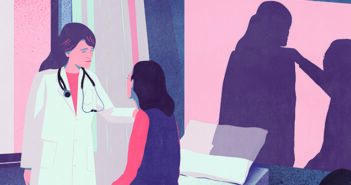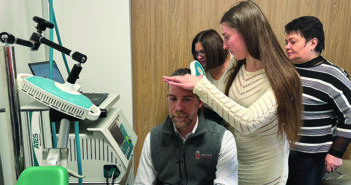Brown classmates head up sibling surgery societies.
During annual Surgical Education Week in April, two Brown-educated surgeons from the same class were coincidentally appointed presidents of their respective surgical education societies.
Amit Joshi ’97 MD’01 took the helm of the Association of Program Directors in Surgery (APDS), while his old medical school friend, Michael Awad ’95 PhD’00 MD’01, became president of the Association for Surgical Education (ASE).
The organizations’ missions overlap, though the ASE has a larger membership and a global mission, Awad says: “We help surgical educators develop surgical education curriculum, perform training assessments, and support their own professional development and leadership skills.” But these are sibling societies without rivalries; they already collaborate on shared goals, and communication between them is bound to increase now that two friends are in the top spots.
In preparing surgeons for successful practices, both new presidents have specific goals for addressing current and future challenges, which include increasing financial pressures, rapidly advancing technology, changing health care delivery models (e.g., telemedicine), and, always at top of mind, physician burnout. Joshi, a former residency program director who received the 2022 Courage to Teach Award from the ACGME, is now the associate dean for graduate medical education and professor of surgery at Cooper Medical School of Rowan University. He also oversees the national curriculum for general surgery for SCORE (Surgical Council on Resident Education).
Residency program directors have a challenging job, Joshi says: “First we are teachers, but we are also human resource officers, guidance counselors, and personal therapists.” He points out that residents are typically in training during peak childbearing years—and it’s often a time when elderly parents might need care.
“We need to make sure that yes, you get rigorous surgical training, but we also have to be flexible for trainees who are dealing with the rest of life,” he says.
“We want to produce a well-vetted product without destroying that product in the process.” Joshi adds, proudly, that about half of today’s surgical trainees are women. “If you go back 20 or 30 years, there were many fewer women in surgery.”
“Fostering diversity” is also an important goal for the ASE, says Awad, a professor of surgery at Washington University School of Medicine. “We are looking at new opportunities for the assessment of our learners to try to mitigate certain biases that permeate traditional assessment methods, which are perhaps slanted against individuals of certain genders, races, or socioeconomic statuses,” he says. Programs could evaluate communication skills, professionalism, and interpersonal interactions, he says, in addition to test scores.
Emerging technologies may help too. Virtual reality-enabled surgical training systems, for example, incorporate objective, immediate performance feedback to provide a quantitative analysis of a surgeon’s performance “so they can compare their own progress to themselves, their peers, and to expert performance,” Awad says. He directs the Washington University Institute for Surgical Education, a surgical simulation center that includes VR training. “That’s my baby,” he says.
Both surgeons met their wives at Brown: Joshi is married to Nikki Ariaratnam ’00 MD’04, a radiologist, and Awad to Jean Wang ’94 MD’98, a gastroenterologist. All are graduates of the Program in Liberal Medical Education.
“Already knowing that I was going on to medical school, I was able to avoid the rat race,” says Awad, who minored in the history of music while concentrating in biochemistry.
“I had an incredible liberal arts education, it made me well rounded, a citizen of the world, and a better physician,” adds Joshi, a pianist who concentrated in music. “I still benefit from that every single day.”




